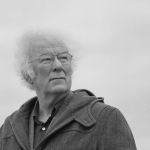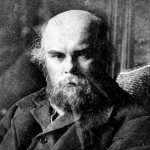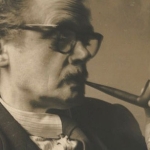By night we linger'd on the lawn,
For underfoot the herb was dry;
And genial warmth; and o'er the sky
The silvery haze of summer drawn;
And calm that let the tapers burn
Unwavering: not a cricket chirr'd:
The brook alone far-off was heard,
And on the board the fluttering urn:
And bats went round in fragrant skies,
And wheel'd or lit the filmy shapes
That haunt the dusk, with ermine capes
And woolly breasts and beaded eyes;
While now we sang old songs that peal'd
From knoll to knoll, where, couch'd at ease,
The white kine glimmer'd, and the trees
Laid their dark arms about the field.
But when those others, one by one,
Withdrew themselves from me and night,
And in the house light after light
Went out, and I was all alone,
A hunger seized my heart; I read
Of that glad year which once had been,
In those fall'n leaves which kept their green,
The noble letters of the dead:
And strangely on the silence broke
The silent-speaking words, and strange
Was love's dumb cry defying change
To test his worth; and strangely spoke
The faith, the vigour, bold to dwell
On doubts that drive the coward back,
And keen thro' wordy snares to track
Suggestion to her inmost cell.
So word by word, and line by line,
The dead man touch'd me from the past,
And all at once it seem'd at last
The living soul was flash'd on mine,
And mine in this was wound, and whirl'd
About empyreal heights of thought,
And came on that which is, and caught
The deep pulsations of the world,
Æonian music measuring out
The steps of Time—the shocks of Chance—
The blows of death. At length my trance
Was cancell'd, stricken thro' with doubt.
Vague words! but ah, how hard to frame
In matter-moulded forms of speech,
Or ev'n for intellect to reach
Thro' memory that which I became:
Till now the doubtful dusk reveal'd
The knolls once more where, couch'd at ease,
The white kine glimmer'd, and the trees
Laid their dark arms about the field:
And suck'd from out the distant gloom
A breeze began to tremble o'er
The large leaves of the sycamore,
And fluctuate all the still perfume,
And gathering freshlier overhead,
Rock'd the full-foliaged elms, and swung
The heavy-folded rose, and flung
The lilies to and fro, and said
"The dawn, the dawn," and died away;
And East and West, without a breath,
Mixt their dim lights, like life and death,
To broaden into boundless day.





Comment form: